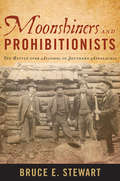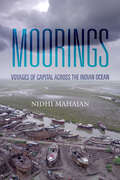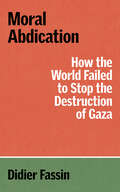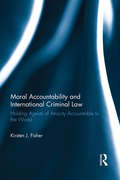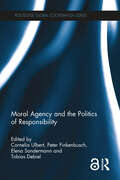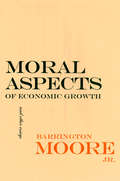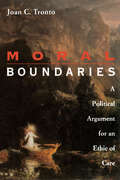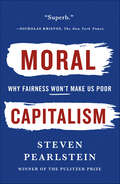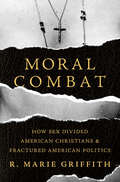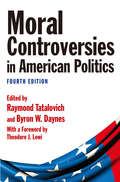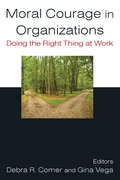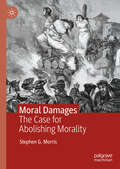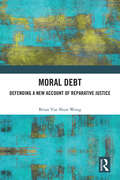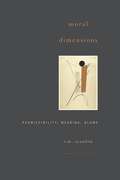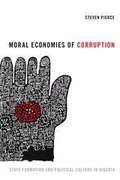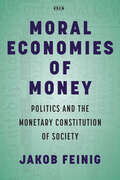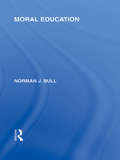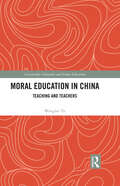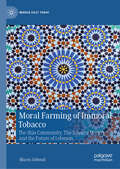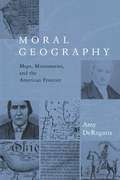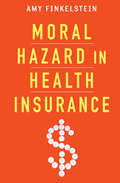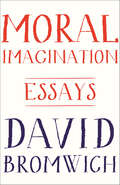- Table View
- List View
Moonshiners and Prohibitionists: The Battle over Alcohol in Southern Appalachia (New Directions in Southern History)
by Bruce E. StewartA &“masterly study&” of how the business of homemade liquor shaped the history and culture of a region (Journal of American History). Homemade liquor has played a prominent role in the Appalachian economy for nearly two centuries. The region endured profound transformations during the extreme prohibition movements of the nineteenth century, when the manufacturing and sale of alcohol—an integral part of daily life for many Appalachians—was banned.Moonshiners and Prohibitionists: The Battle over Alcohol in Southern Appalachia chronicles the social tensions that accompanied the region&’s early transition from a rural to an urban-industrial economy. It analyzes the dynamic relationship of the bootleggers and opponents of liquor sales in western North Carolina, as well as conflict driven by social and economic development that manifested in political discord—and also explores the life of the moonshiner and the many myths that developed around hillbilly stereotypes. &“A much-needed contribution to our understanding of the complex social, economic, religious, and cultural issues underlying the prohibition impulse that swept the South between 1880 and 1920.&” ―Journal of Southern History
Moonshots and the New Industrial Policy: Questioning the Mission Economy (International Studies in Entrepreneurship #56)
by Magnus Henrekson Mikael Stenkula Christian SandströmThis open access book raises some central questions: Do we need moonshot policies to spur innovation and economic growth? What are the risks associated with such policies? Economic turbulence, the COVID-19 pandemic, and mounting environmental concerns have paved the way for a renaissance of targeted industrial policy. In particular, the idea that society should be organized around large missions is gaining momentum among high-income economies. However, the authors and editors of this volume contend that this shift has occurred without much critical examination, especially as the European Union has adopted these ideas, and Western economies are now increasingly organizing toward the achievement of large, state-formulated goals. Recognizing the urgent need for continued scholarly attention to question notions of the mission economy, more than 20 scholars discuss the dangers of top-down/vertical approaches to industrial policy and draw attention to the progress of independent enterprise, entrepreneurialism, and market solutions in a sound economy and society. By critically examining mission-oriented innovation policies, using theoretical perspectives and empirical investigations, the book highlights both the mechanisms behind failed missions and alternative approaches. This is a must-read for policy researchers and policymakers alike.
Moorings: Voyages of Capital across the Indian Ocean
by Nidhi MahajanA free ebook version of this title is available through Luminos, University of California Press's Open Access publishing program. Visit www.luminosoa.org to learn more.Moorings follows sailors from the Gulf of Kachchh in India as they voyage across the Indian Ocean on mechanized wooden sailing vessels known as vahans, or dhows. These voyages produce capital through moorings that are spatial, moral, material, and conceptual. With a view from the dhow, the book examines the social worlds of Muslim seafarers who have been rendered invisible even as they maneuver multiple regulatory regimes and the exigencies of life, navigating colonialism, neoliberalism, the rise of Hindutva, insurgency, climate change, and border regimes across the ocean. Based on historical and ethnographic research aboard ships, at ports, and in religious shrines and homes, Moorings shows how capitalism derives value from historically sedimented practices grounded in caste, gender, and transregional community-based forms of regulation.
Moral Abdication: How the World Failed to Stop the Destruction of Gaza
by Didier FassinWestern governments and elites have supported the destruction of Gaza, silencing the Palestinians and those who speak on their behalf.Providing a record of the first six months of the war waged by the Israeli army after the 7 October attacks and drawing on a rich range of international sources, Didier Fassin examines how most Western governments have acquiesced in and often contributed to the destruction, by the Israeli army, of Gaza, its homes, infrastructures, hospitals, institutions of education, and civilian population. To justify their support and prevent criticism, they have provided an official version of the events, adopting the Israeli narrative. It was largely taken up by mainstream media, which ignored the experiences and perspectives of Palestinians. Dissenting voices were silenced. A policing of language and thought was imposed. Censorship and self-censorship became normalized. To call for a ceasefire or to demand the respect of humanitarian law was enough to prompt the ever-ready accusation of antisemitism. Exploring the multiple dimensions of the extreme inequality of lives between the two sides of the conflict and analyzing the complex geopolitical, economic and ideological stakes that underlie it, Fassin intends to constitute an archive of this moral abdication. In his view, the abandonment of the values and principles proclaimed by Western elites to be foundational will leave a deep scar in the history of the world.
Moral Accountability and International Criminal Law: Holding Agents of Atrocity Accountable to the World
by Kirsten FisherThis book examines international criminal law from a normative perspective and lays out how responsible agents, individuals and the collectives they comprise, ought to be held accountable to the world for the commission of atrocity. The author provides criteria for determining the kinds of actions that should be addressed through international criminal law. Additionally, it asks, and answers, how individual responsibility can be determined in the context of collectively perpetrated political crimes and whether an international criminal justice system can claim universality in a culturally plural world. The book also examines the function of international criminal law and finally considers how the goals and purposes of international law can best be institutionally supported. This book is of particular interest to a multidisciplinary academic audience in political science, philosophy, and law, however the book is written in clear jargon-free prose that is intended to render the arguments accessible to the non-specialist reader interested in global justice, human rights and international criminal law.
Moral Agency and the Politics of Responsibility (ISSN)
by Peter Finkenbusch Tobias Debiel Cornelia Ulbert Elena SondermannAt a time when globalization has side-lined many of the traditional, state-based addressees of legal accountability, it is not clear yet how blame is allocated and contested in the new, highly differentiated, multi-actor governance arrangements of the global economy and world society. Moral Agency and the Politics of Responsibility investigates how actors in complex governance arrangements assign responsibilities to order the world and negotiate who is responsible for what and how.The book asks how moral duties can be defined beyond the territorial and legal confines of the nation-state; and how obligations and accountability mechanisms for a post-national world, in which responsibility remains vague, ambiguous and contested, can be established. Using an empirical as well as a theoretical perspective, the book explores ontological framings of complexity emphasizing emergence and non-linearity, which challenge classic liberal notions of responsibility and moral agency based on the autonomous subject. Moral Agency and the Politics of Responsibility is perfect for scholars from International Relations, Politics, Philosophy and Political Economy with an interest in the topical and increasingly popular topics of moral agency and complexity.The Open Access version of this book, available at http://www.taylorfrancis.com, has been made available under a Creative Commons Attribution-Non Commercial-No Derivatives (CC-BY-ND) 4.0 license.
Moral Agency and the Politics of Responsibility (Routledge Global Cooperation Series)
by Peter Finkenbusch Tobias Debiel Cornelia Ulbert Elena SondermannAt a time when globalization has side-lined many of the traditional, state-based addressees of legal accountability, it is not clear yet how blame is allocated and contested in the new, highly differentiated, multi-actor governance arrangements of the global economy and world society. Moral Agency and the Politics of Responsibility investigates how actors in complex governance arrangements assign responsibilities to order the world and negotiate who is responsible for what and how. The book asks how moral duties can be defined beyond the territorial and legal confines of the nation-state; and how obligations and accountability mechanisms for a post-national world, in which responsibility remains vague, ambiguous and contested, can be established. Using an empirical as well as a theoretical perspective, the book explores ontological framings of complexity emphasizing emergence and non-linearity, which challenge classic liberal notions of responsibility and moral agency based on the autonomous subject. Moral Agency and the Politics of Responsibility is perfect for scholars from International Relations, Politics, Philosophy and Political Economy with an interest in the topical and increasingly popular topics of moral agency and complexity.
Moral Aspects of Economic Growth, and Other Essays (The Wilder House Series in Politics, History and Culture)
by Barrington Moore Jr.Barrington Moore, Jr., one of the most distinguished thinkers in critical theory and historical sociology, was long concerned with the prospects for freedom and decency in industrial society. The product of decades of reflection on issues of authority, inequality, and injustice, this volume analyzes fluctuating moral beliefs and behavior in political and economic affairs at different points in history, from the early Middle Ages in England to the prospects for liberalism under twentieth-century Soviet socialism. The social sources of antisocial behavior; principles of social inequality; and the origins, enemies, and possibilities of rational discussion in public affairs—these are among the topics Moore considers as he seeks to uncover the historical causes of some accepted forms of morality and to assess their social consequences.The keynote essay examines how moral codes grew out of commercial practices in England from medieval times through the industrial revolution. Moore pays special attention to conceptions of honesty and the temptation to evade that inform the volume as a whole. In the other essays, he considers particular political issues, viewing "political" in its broadest sense as an unequal distribution of power and authority that carries a strong moral charge. Free of preaching and advocacy, his work offers a rare reasonable assessment of the morality of major social institutions over time.
Moral Boundaries: A Political Argument for an Ethic of Care
by Joan TrontoIn Moral Boundaries Joan C. Tronto provides one of the most original responses to the controversial questions surrounding women and caring. Tronto demonstrates that feminist thinkers have failed to realise the political context which has shaped their debates about care. It is her belief that care cannot be a useful moral and political concept until its traditional and ideological associations as a "women's morality" are challenged.Moral Boundaries contests the association of care with women as empirically and historically inaccurate, as well as politically unwise. In our society, members of unprivileged groups such as the working classes and people of color also do disproportionate amounts of caring. Tronto presents care as one of the central activites of human life and illustrates the ways in which society degrades the importance of caring in order to maintain the power of those who are privileged.
Moral Capitalism: Why Fairness Won't Make Us Poor
by Steven PearlsteinThe Pulitzer Prize–winning economics journalist explains how America’s capitalist system is broken and how it can be repaired.With a new introduction by the authorThirty years ago, “greed is good” and “maximizing shareholder value” became the new mantras woven into the fabric of our economy, politics, and business culture. Free market capitalism has lifted more than a billion people from poverty around the world. But in the United States, most of its benefits have been captured by the richest ten percent, and it has provided justification for squeezing workers, cheating customers, avoiding taxes, and leaving communities in the lurch. As a result, Americans are losing faith in the free market—and the democratic institutions that support it.In Moral Capitalism, Pulitzer Prize–winning journalist Steven Pearlstein chronicles our descent and challenges the theories being taught in business schools and exercised in boardrooms nationwide. Missing from our current model are vital elements recognized long ago by Adam Smith and Charles Darwin—the mutual trust and cooperation necessary for capitalism to survive and thrive. Pearlstein shows how rising inequality of incomes and opportunity have eroded that social capital, and how restoring fairness need not come at the expense of economic growth. He concludes with bold steps to create a shared prosperity and revive our faith in American capitalism.Previously published as Can American Capitalism Survive?Praise for Moral Capitalism“If anyone can save capitalism from the capitalists, it’s Steven Pearlstein. This lucid, brilliant book refuses to abandon capitalism to those who believe morality and justice irrelevant to an economic system.” —Ezra Klein, founder and editor-at-large, Vox“This book delivers a trenchant critique of the ravages of inequality and a passionate cry for greater balance. [A] powerful, idealistic book.” —The Washington Post
Moral China in the Age of Reform
by Jiwei CiThree decades of dizzying change in China's economy and society have left a tangible record of successes and failures. Less readily accessible but of no less consequence is the story, as illuminated in this book, of what China's reform has done to its people as moral and spiritual beings. Jiwei Ci examines the moral crisis in post-Mao China as a mirror of deep contradictions in the new self as well as in society. He seeks to show that lack of freedom, understood as the moral and political conditions for subjectivity under modern conditions of life, lies at the root of these contradictions, just as enhanced freedom offers the only appropriate escape from them. Rather than a ready-made answer, however, freedom is treated throughout as a pressing question in China's search for a better moral and political culture.
Moral Combat: How Sex Divided American Christians and Fractured American Politics
by R. Marie GriffithFrom an esteemed scholar of American religion and sexuality, a sweeping account of the century of religious conflict that produced our culture wars Gay marriage, transgender rights, birth control--sex is at the heart of many of the most divisive political issues of our age. The origins of these conflicts, historian R. Marie Griffith argues, lie in sharp disagreements that emerged among American Christians a century ago. From the 1920s onward, a once-solid Christian consensus regarding gender roles and sexual morality began to crumble, as liberal Protestants sparred with fundamentalists and Catholics over questions of obscenity, sex education, and abortion. Both those who advocated for greater openness in sexual matters and those who resisted new sexual norms turned to politics to pursue their moral visions for the nation. Moral Combat is a history of how the Christian consensus on sex unraveled, and how this unraveling has made our political battles over sex so ferocious and so intractable.
Moral Controversies in American Politics: Moral Controversies In American Politics
by Theodore J. Lowi Raymond Tatalovich Byron W. DaynesNo area of public policymaking is more hotly debated than the use of government authority to enforce certain standards of behavior in areas of moral controversy. Now thoroughly revised and updated, this collection examines a variety of such policy areas - ranging from abortion and affirmative action to gay rights - including two new chapters on animal rights and hate crimes. In discussing each policy area the book examines relevant issues and arguments, as well as policy shifts over time. It considers the roles of key political and institutional actors in policymaking - including lobbies and interest groups, the bureaucracy, the president, Congress, the judiciary, and state and local authorities. Written in an accessible style that is sure to spark classroom discussion, each chapter of this new edition includes a list of relevant books, web sites, and videos for further research.
Moral Courage in Organizations: Doing the Right Thing at Work
by Gina Vega Debra R. ComerThe topic of moral courage is typically missing from business ethics instruction and management training. But moral courage is what we need when workplace pressures threaten to compromise our values and principles. Moral Courage in Organizations: Doing the Right Thing at Work, edited by Debra Comer and Gina Vega, underscores for readers the ethical pitfalls they can expect to encounter at work and enhances their ability do what they know is right, despite these organizational pressures. The book highlights the effects of organizational factors on ethical behavior; illustrates exemplary moral courage and lapses of moral courage; explores the skills and information that support those who act with moral courage; and considers how to change organizations to promote moral courage, as well as how to exercise moral courage to change organizations. By giving readers who want to do the right thing guidelines for going about it, Moral Courage in Organizations: Doing the Right Thing at Work is a potent tool to foster more ethical organizational behavior.
Moral Damages: The Case for Abolishing Morality
by Stephen G. MorrisDespite the wide-ranging differences in people’s moral perspectives, there is near universal agreement that the world is generally better off when people allow morality to dictate their actions. But what if this view is wrong? What if the very thing that most people think is key to improving human relations is actually a primary contributor to unnecessary suffering and strife? In this book, Stephen G. Morris uses the latest empirical evidence to argue that eliminating all vestiges of morality from our lives (a position known as moral abolitionism) would likely yield benefits on both an individual and a societal level. Though the primary aim is to build a pragmatic case for why we ought to dispense with morality, Morris first argues that there are theoretical reasons for rejecting morality since we lack compelling arguments for the existence of moral facts. From there, he cites extensive evidence suggesting that morality does more harm than good through its negative influence on violence, politics, and personal relationships. Following a discussion of how we have at our disposal the necessary resources (i.e., empathy, prudential self-interest, and reason) to benefit humanity in a world without morality, Morris concludes by offering some specific steps societies could take to help eliminate morality’s corrupting influence and to improve human relations.
Moral Debt: Defending a New Account of Reparative Justice
by Brian Yue Shun WongIn face of historical injustices such as war, colonialism, slavery, and genocides, what responsibilities, if any, do the present generations owe – and to whom are such responsibilities owed? Drawing upon methods of political theory, empirical politics, legal philosophy, and applied ethics, this book advances the novel account of Collective Moral Debt Reparative Justice (CMDRJ).It aims to establish that descendants of victims inherit claims to reparation by which they can hold inheritors of perpetrators responsible for discharging. This argument applies particularly well to collectives meeting the threshold for group agency and complicit agents. Not only does the concept of “moral debt” serve as an emphatic metaphor for the distinctive ways by which perpetrators and victims, descendants and inheritors are connected – it also provides the compelling explanation hitherto missing as for why claims of reparative justice do not go away merely in virtue of the passage of time.The book should interest scholars and practitioners alike and has been written for those who are interested in what we owe others in relation to our past.
Moral Dimensions: Permissibility, Meaning, Blame
by T. M. ScanlonIn a clear and elegant style, T. M. Scanlon reframes current philosophical debates as he explores the moral permissibility of an action. Permissibility may seem to depend on the agent’s reasons for performing an action. For example, there seems to be an important moral difference between tactical bombing and a campaign by terrorists—even if the same number of non-combatants are killed—and this difference may seem to lie in the agents’ respective aims. However, Scanlon argues that the apparent dependence of permissibility on the agent’s reasons in such cases is merely a failure to distinguish between two kinds of moral assessment: assessment of the permissibility of an action and assessment of the way an agent decided what to do. Distinguishing between these two forms of assessment leads Scanlon to an important distinction between the permissibility of an action and its meaning: the significance for others of the agent’s willingness to act in this way. An action’s meaning depends on the agent’s reasons for performing it in a way that its permissibility does not. Blame, he argues, is a response to the meaning of an action rather than its permissibility. This analysis leads to a novel account of the conditions of moral responsibility and to important conclusions about the ethics of blame.
Moral Economies of Corruption: State Formation and Political Culture in Nigeria
by Steven PierceNigeria is famous for "419" e-mails asking recipients for bank account information and for scandals involving the disappearance of billions of dollars from government coffers. Corruption permeates even minor official interactions, from traffic control to university admissions. In Moral Economies of Corruption Steven Pierce provides a cultural history of the last 150 years of corruption in Nigeria as a case study for considering how corruption plays an important role in the processes of political change in all states. He suggests that corruption is best understood in Nigeria, as well as in all other nations, as a culturally contingent set of political discourses and historically embedded practices. The best solution to combatting Nigerian government corruption, Pierce contends, is not through attempts to prevent officials from diverting public revenue to self-interested ends, but to ask how public ends can be served by accommodating Nigeria's history of patronage as a fundamental political principle.
Moral Economies of Money: Politics and the Monetary Constitution of Society (Currencies: New Thinking for Financial Times)
by Jakob FeinigFor much of American history, large numbers of people claimed that money was a public good and asserted the right to shape money creation practices. If popular knowledge about money creation was once widely shared, how and why did it disappear? In this astute new work, Jakob Feinig shows how the relation between money users and money-issuing governments changed from British colonial North America to today's United States, discussing how popular movements reshaped money-creating institutions, and how their opponents attempted to silence them. He also reveals how monetary and political history unfolds in the tension between "moral economies of money" and "monetary silencing." Offering an introduction to money creation practices since the colonial era, the book enables readers to understand why most people are disconnected from knowledge about money creation today. At the same time, the book also allows readers to situate the recent prominence of Modern Monetary Theory (MMT) against a broader historical background. Historians of capitalism, economic and political sociologists, social theorists, anthropologists of money, and anyone seeking to understand monetary activism, will find this book helps to clarify present-day possibilities in light of historical processes.
Moral Education (International Library of the Philosophy of Education Volume 4)
by Norman J. BullA companion volume to Moral Judgement from Childhood to Adolescence specially written for teachers and students of education. This volume includes analysis of the broad stages in the developmental pattern; of the key variables that must shape it, and of their function in moral judgement; and of the principles that must lie behind a moral education that has autonomy as its goal. The book concludes with practical proposals for a sequential pattern of moral learning, and the methods of approach appropriate to it.
Moral Education in China: Teaching and Teachers (Citizenship, Character and Values Education)
by Wangbei YeThe book presents up-to-date research on moral education teaching and teachers in China. By providing an accessible, practical, yet scholarly source of moral education, education aims and teachers’ ethical roles in China, which is also an international concern, the author systematically reviews Moral Education curriculum, moral education pre-service teacher education, current policies and practices of Moral Education teaching and teachers. The book will be resourceful for researchers, practitioners and policymakers in moral education, citizenship education and teacher education.
Moral Farming of Immoral Tobacco: The Shia Community, The Tobacco Market, and the Future of Lebanon (Middle East Today)
by Mazen Abboud"Moral Farming of Immoral Tobacco: The Shia Community, the Tobacco Market, and the Future of Lebanon" explores the ethical and operational complexities of managing a controversial industry in a fragile, divided state neighboring war-torn Syria. It argues that in weak states with porous borders and a thriving underground economy, state monopolies on harmful products provide a more responsible alternative to unregulated markets. The book offers a comprehensive analysis of tobacco's historical, cultural, and political significance in Lebanon, with a focus on its deep-rooted ties to the Shia community. It explores how tobacco shaped Lebanon's political landscape and, in turn, how the country's politics influenced the tobacco sector. The narrative highlights tobacco's integration into Shia identity and examines the interplay between political Shi’ism, the state-owned tobacco monopoly (RLTT), and post-civil war power-sharing arrangements, illustrating how tobacco evolved into both a symbol of resistance and a mechanism for societal stabilization. The RLTT’s strategic responses to regional challenges, including the Syrian crisis and a growing black market, highlight its role in stabilizing Lebanon’s economy amidst state decline. By linking ethnography, market dynamics, and the failures of anti-tobacco campaigns, the narrative offers a unique lens to understand the complexities of Lebanon's tobacco market within its socio-political framework. This analysis equips readers with theoretical and institutional tools to critically assess the broader implications for Lebanon’s future.
Moral Geography: Maps, Missionaries, and the American Frontier (Religion and American Culture)
by Amy DeRogatisMoral Geography traces the development of a moral basis for American expansionism, as Protestant missionaries, using biblical language and metaphors, imaginatively conjoined the cultivation of souls with the cultivation of land and made space sacred. While the political implications of the mapping of American expansion have been much studied, this is the first major study of the close and complex relationship between mapping and missionizing on the American frontier. Moral Geography provides a fresh approach to understanding nineteenth-century Protestant home missions in Ohio's Western Reserve. Through the use of maps, letters, religious tracts, travel narratives, and geographical texts, Amy DeRogatis recovers the struggles of settlers, land surveyors, missionaries, and geographers as they sought to reconcile their hopes and expectations for a Promised Land with the realities of life on the early American frontier.
Moral Hazard in Health Insurance (Kenneth J. Arrow Lecture Series)
by Amy FinkelsteinMoral hazard—the tendency to change behavior when the cost of that behavior will be borne by others—is a particularly tricky question when considering health care. Kenneth J. Arrow's seminal 1963 paper on this topic (included in this volume) was one of the first to explore the implication of moral hazard for health care, and Amy Finkelstein—recognized as one of the world's foremost experts on the topic—here examines this issue in the context of contemporary American health care policy. Drawing on research from both the original RAND Health Insurance Experiment and her own research, including a 2008 Health Insurance Experiment in Oregon, Finkelstein presents compelling evidence that health insurance does indeed affect medical spending and encourages policy solutions that acknowledge and account for this. The volume also features commentaries and insights from other renowned economists, including an introduction by Joseph P. Newhouse that provides context for the discussion, a commentary from Jonathan Gruber that considers provider-side moral hazard, and reflections from Joseph E. Stiglitz and Kenneth J. Arrow.
Moral Imagination: Essays
by David BromwichCompelling essays from one of today's most esteemed cultural criticsSpanning many historical and literary contexts, Moral Imagination brings together a dozen recent essays by one of America's premier cultural critics. David Bromwich explores the importance of imagination and sympathy to suggest how these faculties may illuminate the motives of human action and the reality of justice. These wide-ranging essays address thinkers and topics from Gandhi and Martin Luther King on nonviolent resistance, to the dangers of identity politics, to the psychology of the heroes of classic American literature.Bromwich demonstrates that moral imagination allows us to judge the right and wrong of actions apart from any benefit to ourselves, and he argues that this ability is an innate individual strength, rather than a socially conditioned habit. Political topics addressed here include Edmund Burke and Richard Price's efforts to define patriotism in the first year of the French Revolution, Abraham Lincoln’s principled work of persuasion against slavery in the 1850s, the erosion of privacy in America under the influence of social media, and the use of euphemism to shade and anesthetize reactions to the global war on terror. Throughout, Bromwich considers the relationship between language and power, and the insights language may offer into the corruptions of power.Moral Imagination captures the singular voice of one of the most forceful thinkers working in America today.
